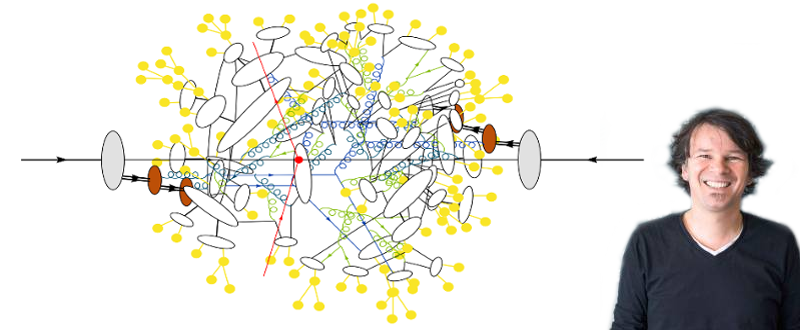
Research Group of PD Dr. Stefan Gieseke
Research in the group of Stefan Gieseke is centered around the development of the Monte Carlo Event Generator Herwig. Herwig is a simulation program for collisions of particles at highest available collider energies, which at the moment are collisions of protons with 13 TeV centre of mass energy as they happen at the Large Hadron Collider (LHC) at CERN in Geneva. This simulation is made with various assumptions and approximations which need to be improved as we get more and more insight into the nature of these collisions. Ultimately, this this is necessary to help us finding signs of Physics Beyond the Standard Model.
One aspect is the precision of predictions from quantum field theory, mostly Quantum Chromodynamics (QCD), the theory of the strong force. As we collide protons, all final states at the LHC are more or less dominated by strongly interacting elementary particles, quarks and gluons. We can predict cross sections and branching ratios for final states from perturbative calculations in QCD which are then matched up to so-called parton showers, where additional emissions of quarks and gluons are simulated within another approximation in order to form particle jets in the observed final states. We permanently work on the improvement of the precision in these perturbative areas as better and better predictions become the state-of-the-art.
At the end of the simulation we describe the transition of the generated quarks and gluons in a hadronization model. At this level we cannot apply perturbative methods of QCD any more as its coupling constant is large in this energy range and the interactions are really strong. Hence, we model this transition and also here we aim for improvements of the model as better data becomes avalailable.
In addition to the hardest, most important scattering in one collision of protons, as it is described by perturbation theory, we also observe the production of particles in additional, so-called multiple partonic interactions. Here we have an admixture of perturbative and non-perturbative pictures in order to simulate this aspect.
The group of Stefan Gieseke at KIT is part of the Herwig
collaboration with members in leading Theoretical Physics institutes
around Europe, e.g. CERN, IPPP Durham, Lund University, Manchester University and University of Vienna. The group is part of the Monte Carlo network MCnet.
Information on Bachelor and Master Theses
If you want to work on a Bachelor's or Master's thesis in Monte Carlo Event Generator development you are welcome to do so in the group of PD Dr. Stefan Gieseke. The research on the event generator Herwig will probably be a part of the problem you are working on. You will need a good command of Theoretical Particle Physics from your attendance of at least one of the canonical courses on this subject. Furthermore, it might be of advantage if you are already familiar with modern computing environments based on Linux/Unix. In your thesis you may write programs in C++, write scripts to run your code in Python or any shell programming language as bash or perl and use Python-based analysis tools to visualize your numerical results. If your topic is more closely related to analytic work in QCD you may also use Mathematica in order to tackle complex analytical problems. Some knowledge or experience in these areas will be of advantage but most importantly you must be willing to learn about these techniques. Don't shy away from this topic because you think you are not experienced enough. Work on your thesis will also include ample opportunities to learn the computational tools through practical day-to-day work and from everyone who is around in the group.
If you think that the simulation of particle collisions at high energy could be a topic for you, please come and talk to me. At best you contact Stefan Gieseke via email in order to make an appointment.
Information on PhD Theses
There is the possibility to work on your PhD thesis in the group of Stefan Gieseke. Often, but not always, the work on a Master's thesis leads into a topic for a PhD thesis. Different possibilities for funding are available, this has to be discussed on a case-by-case basis. Please contact Stefan Gieseke by email if you are interested.
